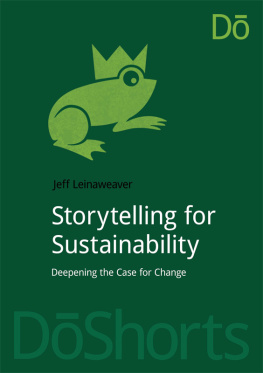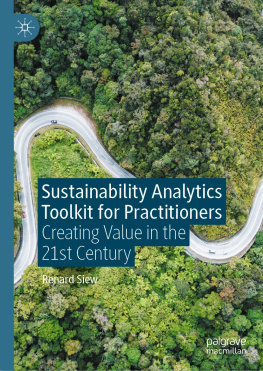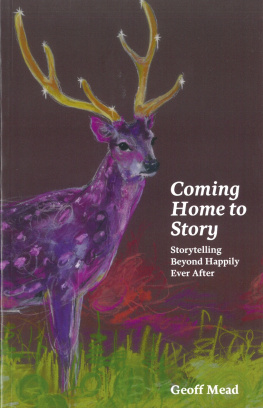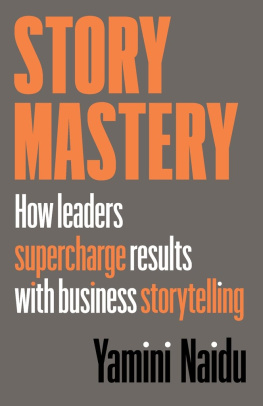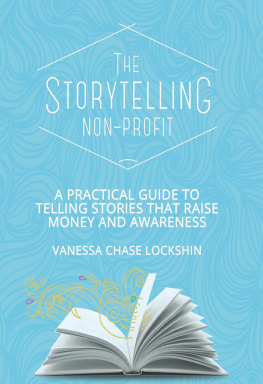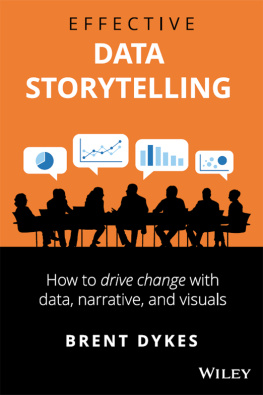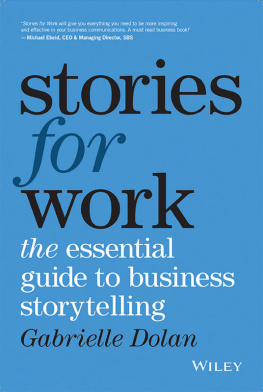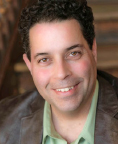Acknowledgments
A NUMBER OF INDIVIDUALS helped provide counsel and support in preparation for this book. I could not have done this without the support, advice and encouragement of Melanie Bigalke, who also helped in creating the graphics. In addition, I appreciate the feedback and wise insight from Alice MacGillivray, Marilyn Price-Mitchell, Jennifer Pontzer, Anne Acosta, Zach Bigalke, Rob Dalton, Tamara Gordy and my wife Joanna. I would also like to dedicate this book to my mentor and friend, Barnett Pearce heres to making better social and sustainable worlds through the stories we tell!
CHAPTER 1
What Makes a Story a Story
Once upon a time
ONCE UPON A TIME, in the not-so-distant past of the greater human story, there was no television and no Internet. There were no smartphones or even books. All we had was story. Communication, entertainment, collective knowledge story was central to the human experience and for survival. Oral stories were passed from one to another on the bridge of breath, from person to person, ancestor to ancestor. The stories told spanned all creation and helped humanity communicate and share knowledge, influence decision-making, entertain, dream and ultimately help us make sense of the worlds around us, both seen and unseen.
A hero is someone who has given his or her life to something bigger than oneself. JOSEPH CAMPBELL
With storytelling central to both individual and community in such a concrete way, being a successful storyteller and story listener was a prized and important survival skill for personal and community sustainability. It is no wonder, then, that there was a common ancient belief that, despite the hardship and challenges of actually living and surviving on a day-to-day basis, the world could only end if all the stories came to an end at the same time. Sitting by the campfire, telling stories, and looking up at the stars was not an optional activity, but key to our longevity as individuals and as part of a greater human tribe.
Our storytelling ancestors were wise. They recognized that there are generally three types and/or levels of stories ongoing in the world at all times:
- The big or mythic stories that helped make sense of the mystery of life, appealing to our sense of awe and wonder of being.
- The middle stories that shape civilization, give image to our gods, explain how power works, how the world ought to be, and how our culture shapes our collective sense of the normal.
- The little stories the stories of an individual life, including our own personal mythos and ongoing exploration of what fate and destiny means to us and whether or not we are living with purpose.
The old storytellers recognized that big stories, middle stories and little stories each serve an essential human function and are organic to this world. Yet these stories often co-exist and function in a way where they are all secretly connected but hidden from view, with each level of story functioning as its own repository of memory.
Because humans are naturally curious and dramatic, these storytellers understood that in order to fully live out ones own personal story in the most meaningful way, everyone in the human tribe must be challenged to search for a pathway of meaning between these three levels of ongoing storytelling. We are hardwired to search for the hero within, and therefore get into two kinds of trouble: good trouble or bad trouble. Good trouble becomes the adventures we seek, the rights we try and wrong, whereas the bad trouble becomes the issues and dragons we try to ignore, deny or dismiss, but still ends up finding us and reluctantly pulling us into the journey kicking and screaming.
| HUMAN HIERARCHY OF STORIES | STORY FUNCTION | STORY LINE LEVEL |
| Big story | Cosmological, awe, mystery | Mythic, sacred, religious, symbolic |
| Middle story | Socio-cultural organizational, educational | Us & them, ancestor she, he, we, us |
| Little story | Individual | I am, me, and the hero within |
To take this challenge, an individual is therefore called into service to something bigger than oneself. Only as a result of this process do we, as individuals, learn how we are secretly (or not) contributing to the ongoing creation of the world by searching for a pathway of meaning between these three levels of ongoing storytelling. This is why it is natural for people to see their own lives as an unfolding story and ongoing personal mythology, where we tell and retell ourselves the story about who we are and our place and purpose in the world. The retrospective process of personal narrative is our own form of memory-making and personal mythologizing. Its how we process the big questions of Who am I? and Why am I here? We are storytelling animals, always in search for meaning through the conduit and nourishment of story.
Now, it is not always an easy thing to do, to find the right type of trouble to get into and search for the connection between these three levels of stories. But when the tumblers fall into place and the little stories, middle stories and big stories connect, our worlds and personal narrative begin to make sense in a new way. We find connection and a deeper purpose and place. We function differently when our many different stories of self and life coalesce. We no longer fear the big mysteries, and what ifs in life, but find signposts of alignment, trust and purpose in our place in the world. We often call this synchronicity: when all of the threads of our story intersect with a jigsaw puzzle of other narratives and events that suddenly make sense in an often compelling and unexplainable way. Its as if we receive a cosmic nod to our own ongoing mythic journeys.

